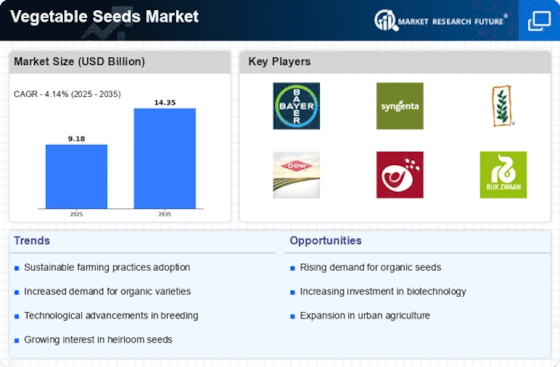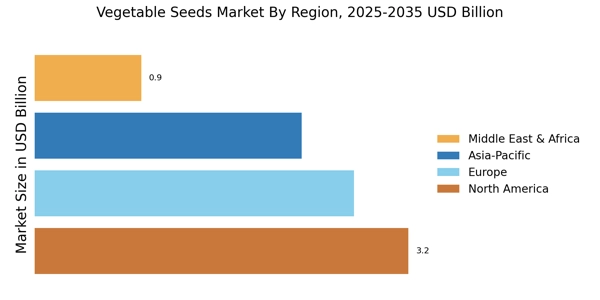Consumer Awareness and Education
Consumer awareness regarding the benefits of home gardening and the nutritional value of fresh vegetables is significantly impacting the Vegetable Seeds Market. As more individuals become educated about the advantages of growing their own food, there is a corresponding increase in demand for vegetable seeds. This trend is particularly evident among younger generations who are more inclined to adopt sustainable practices. Market data indicates that the home gardening segment is expected to grow, with a notable rise in sales of vegetable seeds. This heightened awareness not only drives sales but also encourages a culture of gardening, which could have lasting effects on the Vegetable Seeds Market.
Growing Urban Agriculture Trends
The rise of urban agriculture is emerging as a significant driver in the Vegetable Seeds Market. As urban populations expand, there is a growing interest in cultivating vegetables in urban settings, including rooftops, balconies, and community gardens. This trend is fostering a demand for vegetable seeds that are suitable for small-scale and container gardening. Market data indicates that urban agriculture could account for a substantial share of the vegetable seed market, as more individuals seek to grow their own food for sustainability and health reasons. This shift not only supports local food systems but also encourages the use of innovative growing techniques, further stimulating the Vegetable Seeds Market.
Increased Focus on Food Security
The emphasis on food security is a critical driver influencing the Vegetable Seeds Market. With the global population projected to reach nearly 10 billion by 2050, ensuring a stable food supply is paramount. Governments and organizations are increasingly investing in agricultural research and development to enhance crop yields and resilience. This focus on food security is likely to drive demand for high-quality vegetable seeds that can withstand climate variability and pests. Market data suggests that investments in seed technology and sustainable practices could lead to a more robust Vegetable Seeds Market, as stakeholders prioritize food production to meet future demands.
Rising Demand for Organic Produce
The increasing consumer preference for organic produce is a notable driver in the Vegetable Seeds Market. As health-conscious consumers seek out organic options, the demand for organic vegetable seeds has surged. This trend is reflected in market data, indicating that the organic vegetable seed segment is projected to grow at a compound annual growth rate of approximately 10% over the next five years. This growth is likely to encourage seed companies to invest in organic seed varieties, thereby expanding their product offerings. Furthermore, the shift towards organic farming practices is expected to enhance the overall sustainability of the Vegetable Seeds Market, as it promotes biodiversity and reduces reliance on synthetic inputs.
Technological Innovations in Seed Production
Technological advancements play a crucial role in shaping the Vegetable Seeds Market. Innovations such as genetic engineering, biotechnology, and precision agriculture are revolutionizing seed production. These technologies enable the development of high-yielding, disease-resistant seed varieties that can thrive in diverse environmental conditions. For instance, the introduction of genetically modified seeds has led to increased crop productivity, which is essential for meeting the food demands of a growing population. Market data suggests that the adoption of these technologies could potentially increase The Vegetable Seeds Market size by billions of dollars in the coming years, as farmers seek to enhance their yields and reduce losses due to pests and diseases.

















